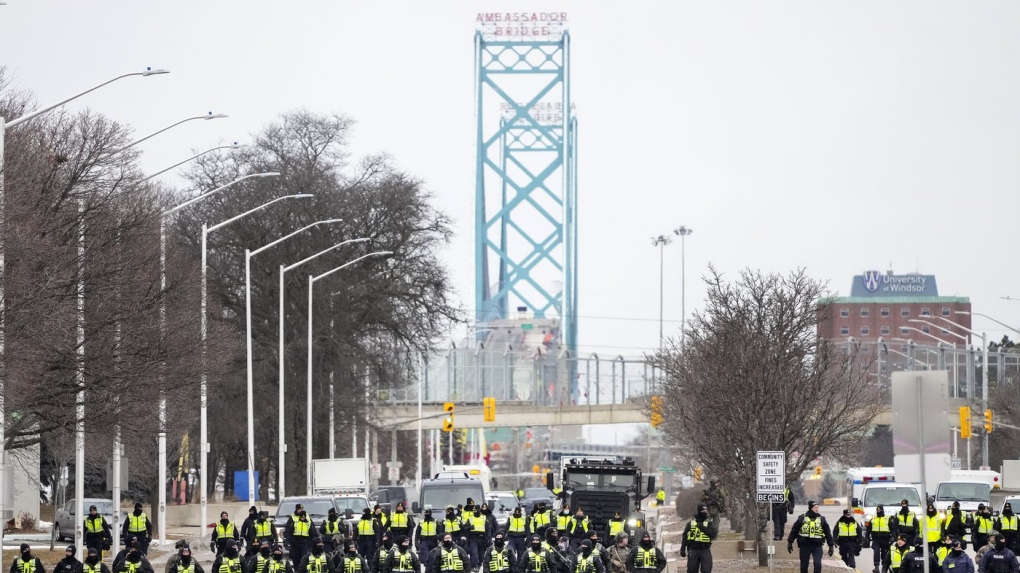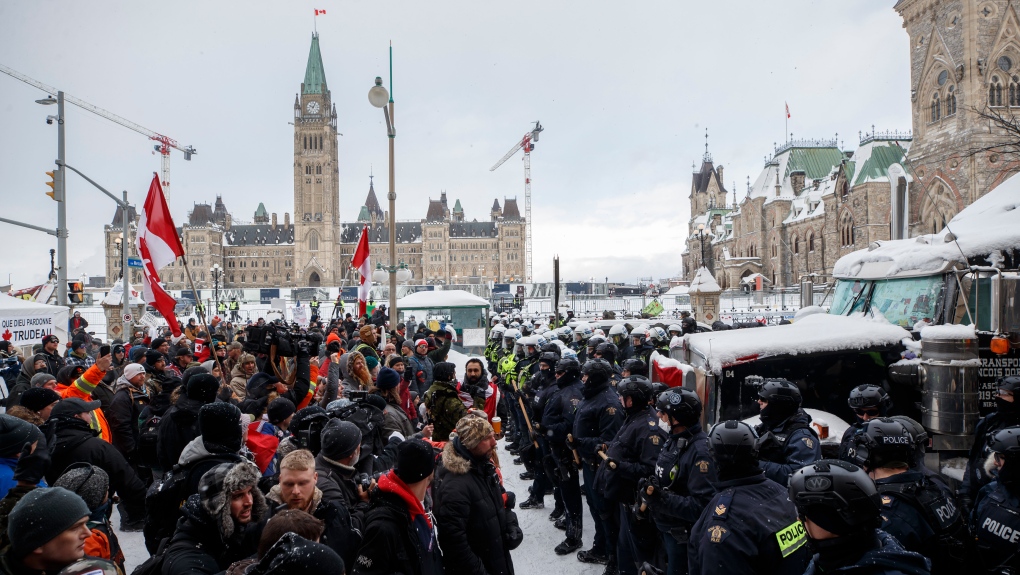Ford's delayed reaction to Freedom Convoy made Ottawa feel abandoned, report finds
A lack of engagement by Ontario Premier Doug Ford left Ottawa feeling abandoned by its provincial government during the “Freedom Convoy” protests, a federal report found.
The report, which was published by the Public Order Emergency Commission on Friday, also found a lack of collaboration by the Ontario government impacted jurisdictional and resourcing issues in the early days of the occupation.
“I find the province of Ontario’s reluctance to become fully engaged in such efforts directed at resolving the situation in Ottawa troubling,” Commissioner Paul Rouleau wrote in the report.
The report concluded the Ford government only increased its engagement more than a week later, when protesters started blocking the Ambassador Bridge in Windsor, resulting in potential financial and trade repercussions.
- Download our app to get local alerts on your device
- Get the latest local updates right to your inbox
Protesters rolled into the capital on the weekend of Jan. 28, 2022, blocking several roads around Parliament Hill.
The convoy stayed in the area for more than three weeks, forcing businesses to close, and causing headaches for nearby residents who were exposed to loud noises and, in some cases, unsafe environments.
The commission found that Ontario’s refusal to participate in tripartite discussions with Ottawa and the federal government was based on the view that the convoy was “protesting a federal vaccine mandate on Parliament’s doorstep,” meaning the responsibility for resolving the situation fell largely on Trudeau’s shoulders.
The second reason was that it was a policing matter best left to the Ontario Provincial Police (OPP).
“While Ontario sent representatives to the staff table, it was absent at the political table,” Rouleau wrote. “Premier Ford told Mayor Watson that he did not believe these meetings would be productive. Solicitor General Jones was of the view that responding to the protests was a law enforcement issue to be dealt with between OPS Chief Sloly and OPP Commissioner Thomas Carrique, not political officials.”
However, when protesters started impeding traffic on the Ambassador Bridge, described as Canada’s busiest commercial link to the United States, Ford took action.
 Police walk the line to remove truckers and supporters after a court injunction gave police the power to enforce the law after protesters blocked the access leading from the Ambassador Bridge in Windsor, Ont., Sunday, Feb. 13, 2022. The federal government is giving Windsor up to $6.9 million in compensation for dealing with "Freedom Convoy" protests that blocked the Ambassador Bridge in the southwest Ontario city earlier this year. THE CANADIAN PRESS/Nathan Denette
Police walk the line to remove truckers and supporters after a court injunction gave police the power to enforce the law after protesters blocked the access leading from the Ambassador Bridge in Windsor, Ont., Sunday, Feb. 13, 2022. The federal government is giving Windsor up to $6.9 million in compensation for dealing with "Freedom Convoy" protests that blocked the Ambassador Bridge in the southwest Ontario city earlier this year. THE CANADIAN PRESS/Nathan Denette
The report found Ford expressed frustration in a Feb. 9 phone call with Trudeau over how the protests had been handled in Ottawa, before saying the “bigger” concern was in Windsor.
“He was concerned that protests could spread to other ports of entry, and highlighted that the Ambassador Bridge blockade was costing hundreds of millions of dollars in trade per day,” the report said.
“It was not until Prime Minister Trudeau spoke to Premier Doug Ford on February 9, after the Ambassador Bridge blockade, that collaboration became the name of the game. It is unfortunate that such collaboration did not take place days earlier.”
On Feb. 14, Ford declared a state of emergency to end what he called a “siege” in Ottawa and Windsor.
The declaration didn’t change much for the protesters in Ottawa, as it provided specific legal authorities to protect international border crossings, as well as 400-series highways, airports, bridges, ports and railways in the province.
At the time, the premier said the orders will “make crystal clear it is illegal and punishable to block and impede the movement of goods, people and services along critical infrastructure.”
The report notes that “had there been greater collaboration at the political level from the start, it could well have assisted in ironing out the communication, jurisdictional, and resourcing issues that plagued the early response to the protests.”
“It could also have assisted in identifying authorities available to each level of government that might have been used to respond to the protests and coordinate direct engagement with protesters. It could also have provided the people of Ottawa with a clear message that they had not been abandoned by their provincial government during a time of crisis.”
 Police move in to clear downtown Ottawa near Parliament hill of protesters after weeks of demonstrations on Saturday, Feb. 19, 2022. THE CANADIAN PRESS/Cole Burston
Police move in to clear downtown Ottawa near Parliament hill of protesters after weeks of demonstrations on Saturday, Feb. 19, 2022. THE CANADIAN PRESS/Cole Burston
A spokesperson for the Ontario Solicitor General said in a statement Friday that its government was “squarely focused on providing the tools our policing partners needed to bring the situation to an end.”
“The Ontario Provincial Police provided intelligence before the occupations even began, deployed officers, and continued to provide resources to Ottawa Police and Windsor Police Services in response to their requests for further operational support.”
The spokesperson did not address all of the claims in the report. Instead, they pointed to the actions the government did take, including the declaration of a state of emergency, and freezing convoy funds “to hinder efforts to continue illegally occupying the streets of Ottawa.”
‘COMPLAINTS DIFFICULT TO ASSESS’
The commission said certain complaints regarding Ontario’s absence during the Freedom Convoy were “difficult to assess” as neither Ford nor Sylvia Jones, who was the province’s Solicitor General at the time, participated in the inquiry.
Both politicians named parliamentary privilege as the reason why they could not testify after being summoned by the commission. The matter was brought to the courts, and Ford and Jones won.
Instead, Rouleau said the province produced about 1,000 documents, and that the deputy minister and an assistant deputy minister provided testimony.
Rouleau claimed in the report that, as a result, the commission is “at a regrettable disadvantage in its understanding of Ontario’s perspective.”
For example, the commission found Jones’ claim that more than 1,500 OPP officers had been on the ground since the beginning of the protest was not only incorrect, but also “unhelpful” and “unwise.”
In reality, the OPP said there were 1,500 officer shifts that had been filled.
“When pushed on whether the solicitor general was politicizing the issue of police resources through this statement, Commissioner Carrique indicated that the Commission would need to ask the solicitor general herself; however, as discussed previously, Solicitor General Jones refused to testify before the Commission,” Rouleau said.
The commission also found the Ontario Ministry of the Solicitor General has a duty to monitor effective policing in Ottawa, and therefore, it fell to the ministry to provide guidance to the Ottawa Police Services Board.
“I find that, based on what the Ministry knew at the time, it would have been preferable if it had acted,” the report read.
Interim Liberal Leader John Fraser said the report confirms the Progressive Conservative government “abandoned the people of Ottawa when they needed their support.”
“To have an entire chapter of the report dedicated to ‘Ontario’s Absence’ is appalling,” he said in a statement. “It’s clear that Doug Ford’s refusal to testify was an attempt to hide his failure to act when Ottawa was under siege. He needs to apologize today, to the residents of Ottawa and all citizens of Ontario, for his dereliction of duty.”
CTVNews.ca Top Stories

'She will not be missed': Trump on Freeland's departure from cabinet
As Canadians watched a day of considerable political turmoil for Prime Minister Justin Trudeau and his government given the sudden departure of Chrystia Freeland on Monday, it appears that U.S. president-elect Donald Trump was also watching it unfold.
Canadian government to make border security announcement today: sources
The federal government will make an announcement on new border security measures after question today, CTV News has learned.
Canada's inflation rate down a tick to 1.9% in November
Inflation edged down slightly to 1.9 per cent in November as price growth continued to stabilize in Canada.
The Canada Post strike is over, but it will take time to get back to normal, says spokesperson
Canada Post workers are back on the job after a gruelling four-week strike that halted deliveries across the county, but it could take time before operations are back to normal.
Transit riders work together to rescue scared cat from underneath TTC streetcar
A group of TTC riders banded together to rescue a woman's cat from underneath a streetcar in downtown Toronto, saving one of its nine lives.
Two employees charged in death of assisted care resident who ended up locked outside building overnight
Two employees at an Oshawa assisted living facility are facing charges in connection with the death of a resident who wandered outside the building during the winter and ended up locked outside all night.
Trudeau considering his options as leader after Freeland quits cabinet, sources say
Chrystia Freeland, Canada's finance minister, said in an explosive letter published Monday morning that she will quit cabinet. Here's what happened on Monday, Dec. 16.
Teacher and a teenage student killed in a shooting at a Christian school in Wisconsin
A 15-year-old student killed a teacher and another teenager with a handgun Monday at a Christian school in Wisconsin, terrifying classmates including a second grader who made the 911 call that sent dozens of police officers rushing to the small school just a week before its Christmas break.
A top Russian general is killed in a Moscow bombing claimed by Ukraine
A senior Russian general was killed Tuesday by a bomb hidden in a scooter outside his apartment building in Moscow, a day after Ukraine's security service levelled criminal charges against him. A Ukrainian official said the service carried out the attack.
































